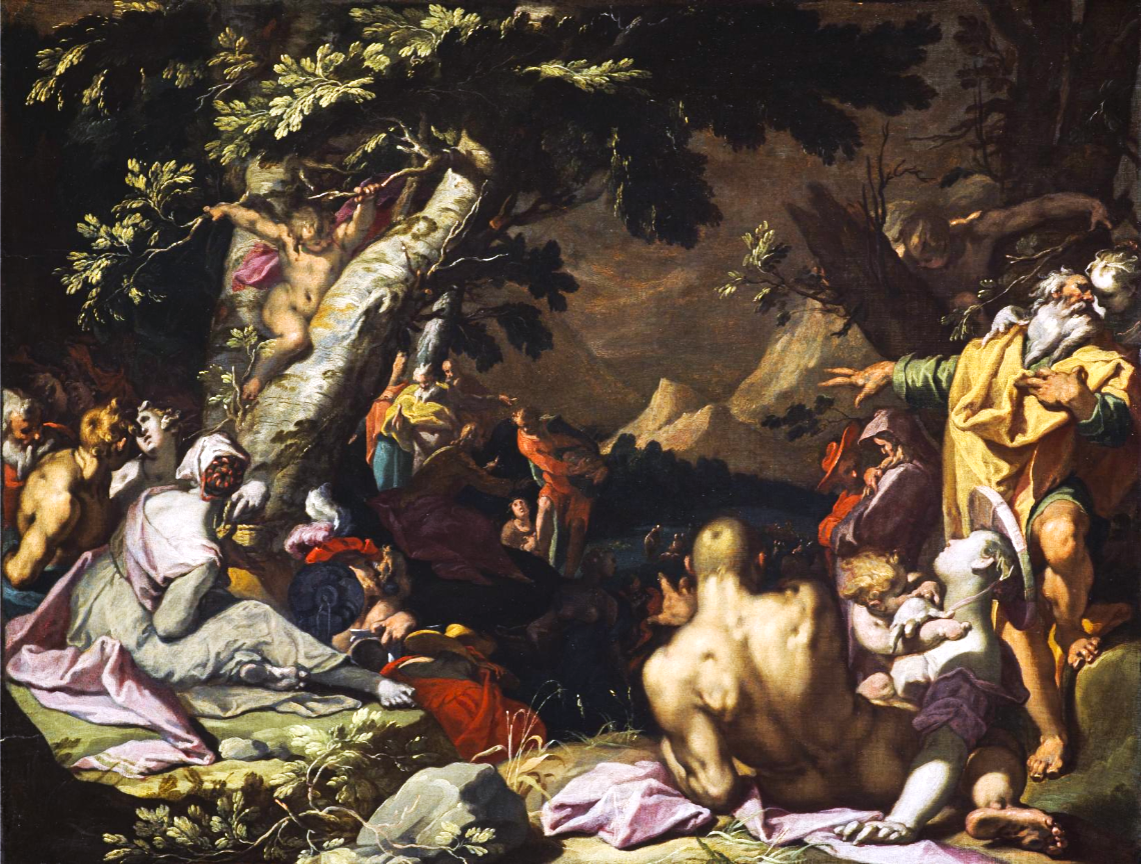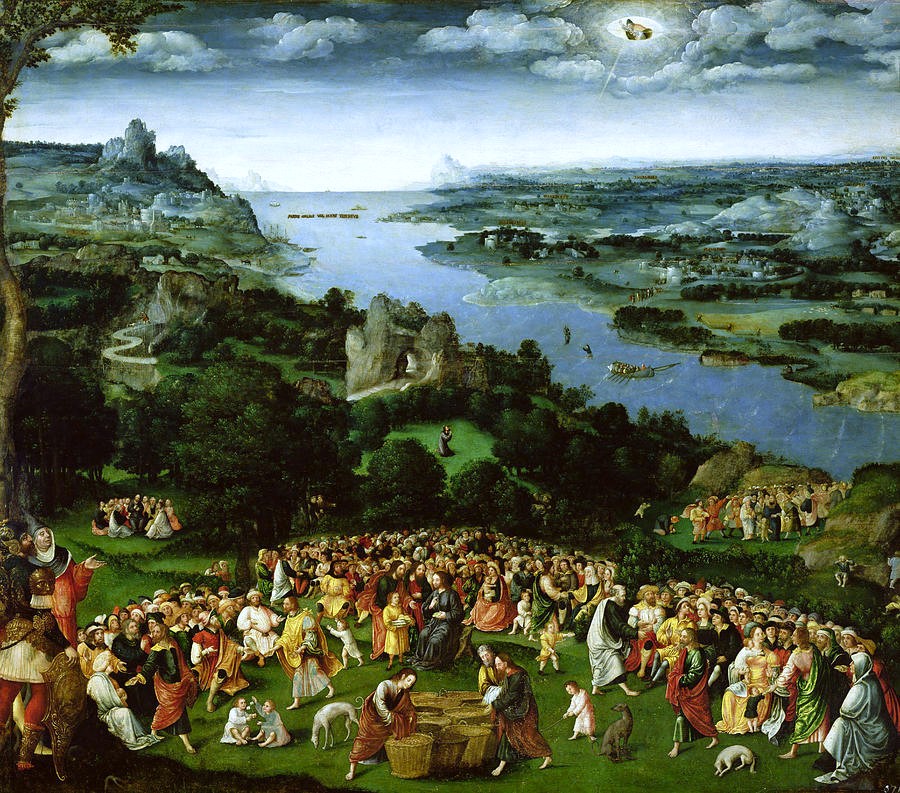Translation of the Holy Gospel According to John
At that time, Jesus went over the Sea of Galilee which is that of Tiberias; and a great multitude followed Him, because they saw the miracles which He did on them that were diseased. Jesus therefore went up into a mountain, and there He sat with His disciples. Now the pasch, the festival day of the Jews, was near at hand. When Jesus therefore had lifted up His eyes, and seen that a very great multitude cometh to Him, He said to Philip, Whence shall we buy bread that these may eat? And this He said to try him; for He Himself knew what He would do. Philip answered Him, Two hundred penny-worth of bread is not sufficient for them, that every one may take a little. One of His disciples, Andrew, the brother of Simon Peter, saith to Him, There is a boy here that hath five barley loaves and two fishes; but what are these among so many? Then Jesus said: Make the men sit down. Now there was much grass in the place. The men therefore sat down, in number about five thousand. And Jesus took the loaves; and when He had given thanks, He distributed to them that were set down. In like manner also of the fishes, as much as they would. And when they were filled, He said to His disciples, Gather up the fragments that remain, lest they be lost. They gathered up therefore, and filled twelve baskets with the fragments of the five barley loaves, which remained over and above to them that had eaten. Now those men, when they had seen what a miracle Jesus had done, said, This is of a truth the prophet that is to come into the world. Jesus therefore, when He knew that they would come to take Him by force and make Him king, fled again into the mountain Himself alone.
From St. Augustine’s Homilies On The Gospel of John: Tract XXIV
To run over it briefly: by the five loaves are understood the five books of Moses; and rightly are they not wheaten but barley loaves, because they belong to the Old Testament. And you know that barley is so formed that we get at its pith with difficulty; for the pith is covered in a coating of husk, and the husk itself tenacious and closely adhering, so as to be stripped off with labor. Such is the letter of the Old Testament, invested in a covering of carnal sacraments: but yet, if we get at its pith, it feeds and satisfies us. A certain lad, then, brought five loaves and two fishes. If we inquire who this lad was, perhaps it was the people Israel, which, in a childish sense, carried, not ate. For the things which they carried were a burden while shut up, but when opened afforded nourishment. And as for the two fishes, they appear to us to signify those two sublime persons, in the Old Testament, of priest and of ruler, who were anointed for the sanctifying and governing of the people. And at length Himself in the mystery came, who was signified by those persons: He at length came who was pointed out by the pith of the barley, but concealed by its husk. He came, sustaining in His one person the two characters of priest and ruler: of priest by offering Himself to God as a victim for us; of ruler, because by Him we are governed. And the things that were carried closed are now opened up. Thanks be to Him. He has fulfilled by Himself what was promised in the Old Testament. And He bade the loaves to be broken; in the breaking they are multiplied. Nothing is more true. For when those five books of Moses are expounded, how many books have they made by being broken up, as it were; that is, by being opened and laid out? But because in that barley the ignorance of the first people was veiled, of whom it is said, Whilst Moses is read, the veil is upon their hearts; for the veil was not yet removed, because Christ had not yet come; not yet was the veil of the temple rent, while Christ is hanging on the cross: because, I say, the ignorance of the people was in the law, therefore that proving by the Lord made the ignorance of the disciple manifest.
Wherefore nothing is without meaning; everything is significant, but requires one that understands: for even this number of the people fed, signified the people that were under the law. For why were there five thousand, but because they were under the law, which is unfolded in the five books of Moses? Why were the sick laid at those five porches, but not healed? He, however, there cured the impotent man, who here fed multitudes with five loaves. Moreover, they sat down upon the grass; therefore understood carnally, and rested in the carnal. For all flesh is grass. And what were those fragments, but things which the people were not able to eat? We understand them to be certain matters of more hidden meaning, which the multitude are not able to take in. What remains then, but that those matters of more hidden meaning, which the multitude cannot take in, be entrusted to men who are fit to teach others also, just as were the apostles? Why were twelve baskets filled? This was done both marvellously, because a great thing was done; and it was done profitably, because a spiritual thing was done. They who at the time saw it, marvelled; but we, hearing of it, do not marvel. For it was done that they might see it, but it was written that we might hear it. What the eyes were able to do in their case, that faith does in our case. We perceive, namely, with the mind, what we could not with the eyes: and we are preferred before them, because of us it is said, Blessed are they who see not, and yet believe. And I add that, perhaps, we have understood what that crowd did not understand. And we have been fed in reality, in that we have been able to get at the pith of the barley.
Lastly, what did those men who saw this miracle think? The men, saith he, when they had seen the sign which He had done, said, This is indeed a prophet. Perhaps they still thought Christ to be a prophet for this reason, namely, that they were sitting on the grass. But He was the Lord of the prophets, the fulfiller of the prophets, the sanctifier of the prophets, but yet a prophet also: for it was said to Moses, I will raise up for them a prophet like unto thee. Like, according to the flesh, but not according to the majesty. And that this promise of the Lord is to be understood concerning Christ Himself, is clearly expounded and read in the Acts of the Apostles. And the Lord says of Himself, A prophet is not without honor, except in his own country. The Lord is a prophet, and the Lord is God’s Word, and no prophet prophesies without the Word of God: the Word of God is with the prophets, and the Word of God is a prophet. The former times obtained prophets inspired and filled by the Word of God: we have obtained the very Word of God for our prophet. But Christ is in such manner a prophet, the Lord of prophets, as Christ is an angel, the Lord of angels. For He is also called the Angel of Great Counsel. Nevertheless, what says the prophet elsewhere that not an ambassador, nor an angel, but Himself coming will save them; that is, He will not send an ambassador to save them, nor an angel, but Himself will come. Who will come? The Angel himself? Certainly not by an angel will He save them, except that He is so an angel, as also Lord of angels. For angels signify messengers. If Christ brought no message, He would not be called an angel: if Christ prophesied nothing, He would not be called a prophet. He has exhorted us to faith and to laying hold of eternal life; He has proclaimed something present, foretold something future because He proclaimed the present, thence He was an angel or messenger; because He foretold the future, thence He was a prophet; and that, as the Word of God He was made flesh, thence He was Lord of angels and of prophets.


